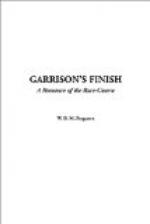He sat on the bed endeavoring to recall some of his past life; even the faintest gleam. Then absently he turned over the photograph he held. On the reserve side of the leaf was the record of Billy Garrison. Garrison studied it eagerly.
“Born in eighty-two. Just my age, I guess—though I can’t swear how old I am, for I don’t know. Stable-boy for James R. Keene. Contract bought by Henry Waterbury. Highest price ever paid for bought-up contract. H’m! Garrison was worth something. First win on the Gravesend track when seventeen. A native of New York City. H’m! Rode two Suburban winners; two Brooklyn Handicaps; Carter Handicap; the Grand Prix, France; the Metropolitan Handicap; the English Derby—Oh, shucks! I never did all those things; never in God’s world,” he grunted wearily. “I wouldn’t be here if I had. It’s all a mistake. I knew it was. Sue was kidding me. And yet—they say the real Billy Garrison has disappeared. That’s funny, too.”
He took a few restless paces about the room. “I’ll go down and pump the major,” he decided finally. “Maybe unconsciously he’ll help me to remember. I’m in a fog. He ought to know Garrison. If I am Billy Garrison—then by my present rank deception I’ve queered a good record. But I know I’m not. I’m a nobody. A dishonest nobody to boot.”
Major Calvert was seated by his desk in the great old-fashioned library, intently scanning various racing-sheets and the multitudinous data of the track. A greater part of his time went to the cultivation of his one hobby—the track and horses—for by reason of his financial standing, having large cotton and real-estate holdings in the State, he could afford to use business as a pastime.
He spent his mornings and afternoons either in his stables or at the extensive training-quarters of his stud, where he was as indefatigable a rail-bird as any pristine stable-boy.
A friendly rivalry had long existed between his neighbor and friend, Colonel Desha, and himself in the matter of horse-flesh. The colonel was from Kentucky—Kentucky origin—and his boast was that his native State could not be surpassed either in regard to the quality of its horses or women. And, though chivalrous, the colonel always mentioned “women” last.
“Just look at Rogue and my daughter, Sue, suh,” he was wont to say with pardonable pride. “Thoroughbreds both, suh.”
It was a matter of record that the colonel, though less financially able, was a better judge of horses than his friend and rival, the major, and at the various county meets it was Major Calvert who always ran second to Colonel Desha’s first.
The colonel’s faith in Rogue had been vindicated at the last Carter Handicap, and his owner was now stimulating his ambition for higher flights. And thus far, the major, despite all his expenditures and lavish care, could only show one county win for his stable. His friend’s success had aroused him, and deep down in his secret heart he vowed he would carry off the next prize Colonel Desha entered for, even if it was one of the classic handicaps itself.




